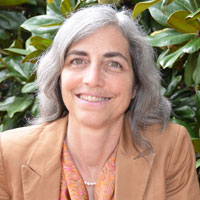Gillings School faculty member joins other experts in independent review of air quality standards, urges EPA to take appropriate action
November 12, 2019
In 2018, the United States Environmental Protection Agency (EPA) disbanded their 26-member Particulate Matter Review Panel.

Dr. Barbara Turpin
Barbara Turpin, PhD, professor and chair in the Department of Environmental Sciences and Engineering at the UNC Gillings School of Global Public Health, is a former member. She, along with several other experts, has chosen to continue with the charge of the former panel, independently providing scientific advice on healthy standards for particulate air pollution.
The EPA is required by the Clean Air Act to reexamine the body of scientific evidence every five years. They must determine whether the current standards for particulate matter – tiny, chemical-filled particles in the air that are harmful to humans – are protective, and set new standards if they are not. The Particulate Matter Review Panel historically provided scientific expertise on particulate matter sources, chemistry, exposures, health effects and epidemiology to assist the EPA’s Clean Air Science Advisory Committee (CASAC) in an external review of the work of the EPA staff.
Airborne fine particles are 30 times smaller than the width of a human hair — small enough to be breathed into the lungs, where they cause damage. The pollution found in these particles includes thousands of chemicals that come from motor vehicle exhaust, power plants, industrial sites, residential wood burning and wildfires. This kind of pollution is linked to deaths from cardiovascular disease and cancer, and also exacerbates asthma.
The EPA’s dismissal of the Particulate Matter Review Panel left CASAC without the scientific expertise necessary to adequately review EPA work and ensure the integrity of the process. Seeing this need, panel members decided to re-form as the Independent Particulate Matter Review Panel out of a sense of civic duty to protect public health. The group recently submitted their report to the EPA, outlining the most recent peer-reviewed scholarly evidence and updates that suggest standard levels of particle pollution are too high and are putting the health of Americans at risk.
“We think it’s important for science to drive policy,” says Turpin. “The risk of not reviewing the science and not setting science-based standards is that people will be unnecessarily exposed to unhealthy levels of air pollutants and excess mortality.”
Turpin says the panel’s independent review of the literature was conducted with the same level of integrity as in prior years using the same official processes, open meetings laws and ethical practices, even though the panel members had been dismissed and were not compensated for their work. At least 20 of the original 26 members participated in the latest review, and their letter to EPA administrator Andrew Wheeler, JD — which revealed that the standards for particulate matter in the air are too high and need to be addressed — was submitted as public comment (PDF).
“Air quality standards should be based on science in order to protect the public. We show that the current standards aren’t adequate to protect health and we make recommendations for updating those standards based on the current scientific information,” says Turpin. “Our hope is that the Administrator will take our scientific assessment into consideration when he makes a decision regarding the new standards.”
Turpin says if CASAC relies on the panel’s recommendations, the EPA may reevaluate the standards, and each state would have the opportunity to decide how to meet the new standards through policies on local industries, motor vehicle emissions and more.
“The latest figures from the American Lung Association state that 140 million people in America live in counties that have unhealthy air,” she says. “Deaths due to air pollution are preventable, but they kill more Americans than transportation accidents and shootings combined, more than diabetes or breast cancer.”
Read more from Turpin on air pollution and health statistics in a column from The Conversation.
Contact the Gillings School of Global Public Health communications team at sphcomm@listserv.unc.edu.
